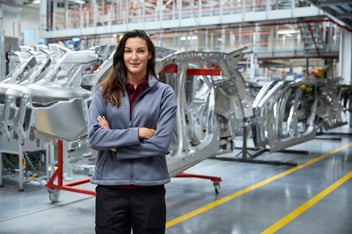
The benefits of engineering impact nearly every industry.
In fact, the work engineers do affects every facet of today’s modern world — from the intelligent transportation systems we use to the pharmaceuticals we consume, from the technology that fuels aerospace exploration to innovations in robotic surgery that bring a new measure of safety to modern medicine.
In other words, engineers have the power to
positively impact humanity.
The influences of engineering are far-reaching, and it is important to distinguish between the types of engineering and explore how the different branches improve the quality of life for millions around the globe.
Are you unsure whether a master of engineering or master of science is right for you? Take our quiz to discover which path best suits your goals!
The Major Branches of Engineering: Top Engineering Degrees to Consider
1. Risk, Reliability and Resilience
Natural hazards, man-made attacks, malfunctions and accidents are disruptive events that threaten the critical systems, processes and devices that support the social and economic well-being of a society.
Our critical systems have to be able not only to withstand such events, but also recover from them to an acceptable level of performance within a desired duration.
Engineers working in the unique field of risk, reliability and resilience are responsible for making informed decisions that properly account for uncertainty and risk in order to enhance quality, efficiency, safety, security and environmental protection.
Average Annual Salary
$100,6600
Job Growth Rate
4 percent (as fast as average)
2. Chemical Engineering
Everything around us and everything we encounter on a daily basis is made up of chemicals.
Responsible for discovering and manufacturing better-quality products that will improve the environment and people’s health, chemical engineers are needed to produce many of the useful products that so many industries rely on.
Average Annual Salary
$106,260
Job Growth Rate
8 percent (faster than average)
3. Cyber-physical Systems
Cyber-physical systems technology supports a wide variety of domains and landscapes including the smart grid, smart cities, smart manufacturing and smart transportation, and ultimately, CPS technology is responsible for perpetuating technological advancements.
Cyber-physical systems technology results in a continuous cycle of improvement and advancement in fields related to technology, medicine, sustainability and beyond.
Average Annual Salary
$150,900
Job Growth Rate
The job growth rate is projected to be quite high. In fact, currently, companies need more CPS engineers than are available for hire.
4. Electrical Engineering
Electrical engineers exist at the forefront of technological advancement, and they have the potential to impact virtually every human system, from health care to education, from transportation to defense.
They are tasked with developing solutions for some of the most essential, critical systems that exist today by working on robotics, computer networks, wireless communications or medical imaging.
Average Annual Salary
$104,610
Job Growth Rate
5 percent (faster than average)
5. Surgery and Intervention
Over the past several decades, breakthroughs in biomedical science have been witnessed within laboratory research, but the ability to translate those discoveries and make new discoveries has been a challenge. The development and evaluation of novel solutions in this field require that the barrier between clinical teams and technical teams be eliminated, revolutionizing healthcare engineering and modern procedural medicine.
With a master of engineering in surgery and intervention, the next generation of surgeons, interventional radiologists, computer scientists and engineers can work together to solve complex medical problems.
Average Annual Salary
$112,000
Job Growth Rate
8 percent (faster than average)
6. Mechanical Engineering
Responsible for designing, developing and building power-producing devices, mechanical engineers work in almost every area of technology.
Autonomous vehicles, air conditioning systems, robotics, space crafts and electric generators are just a few of the many mechanics that exist because of mechanical engineers.
Average Annual Salary
$96,310
Job Growth Rate
10 percent (much faster than average)
7. Civil Engineering
The infrastructure systems that make up our world, such as highways, skyscrapers, railways, bridges and water reservoirs are a direct result of the work that civil engineers envision, develop and oversee.
Civil engineers work in tandem with project managers, architects and builders in order to take theory and apply it to the built environment.
Average Annual Salary
$89,940
Job Growth Rate
5 percent (faster than average)
8. Environmental Engineering
Climate change, food insecurity and pollution — the environment is vulnerable for these reasons and many more.
Environmental engineers work to develop sustainable solutions for several industries and work tirelessly to create and improve systems that affect efforts such as clean recycling, air pollution control and sustainable agriculture.
Average Annual Salary
$96,530
Job Growth Rate
6 percent (faster than average)
9. Computer Science
Tasked with finding "new approaches to computing technology," computer scientists often work in tandem with software, electrical or mechanical engineers to conduct research, develop new products and envision solutions to challenges related to technological fields like artificial intelligence and robotics.
The field of computer science attracts ambitious, bright and innovative thinkers who are passionate about improving the critical computing devices that so many fields and communities rely upon.
Masters in Computer Science Salary
$136,620
Job Growth Rate
23 percent (much faster than average)
10. Biomedical Engineering
Biomedical engineers greatly contribute to the advancement of medical-related technologies. In studying medicine and biology, these engineers develop technologies, such as medical diagnostic machines, medical instruments and prosthetic devices all with the goal of improving the health and quality of life for others.
Average Annual Salary
$99,550
Job Growth Rate
5 percent (faster than average)
*Statistics taken from the Bureau of Labor Statistics, Glassdoor and ZipRecruiter.
Reach your highest potential at Vanderbilt University School of Engineering
No matter what branch of engineering you’re passionate about, a graduate engineering degree from Vanderbilt School of Engineering will empower and position you to achieve a lucrative career full of impact. Graduates of the School of Engineering enter their respective industries with the skills and knowledge needed to impact progress and challenge conventional thinking.
If you are ready to transform your career and nurture your spirit of ambition, then we encourage you to request more information or start your online application today.









